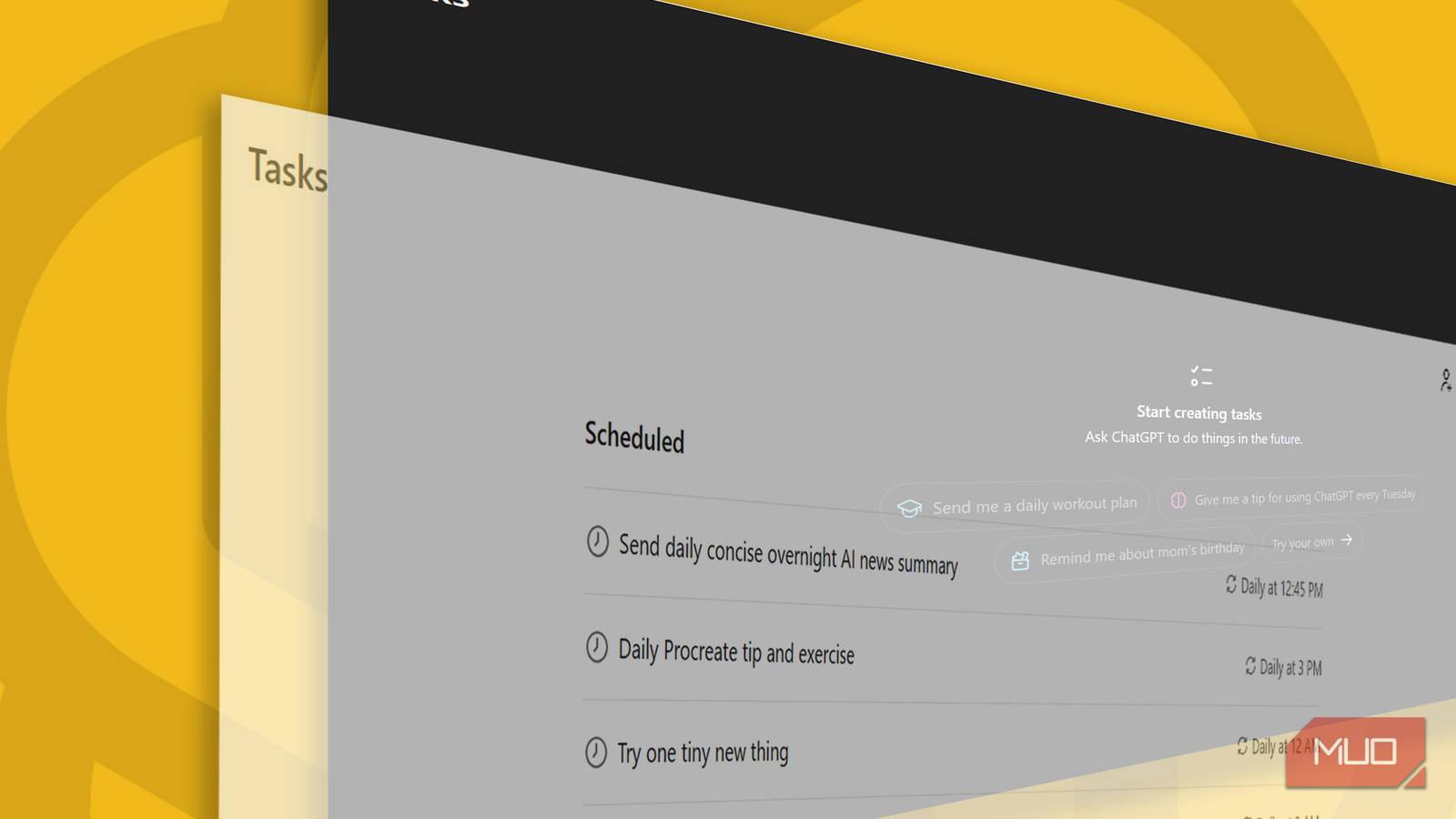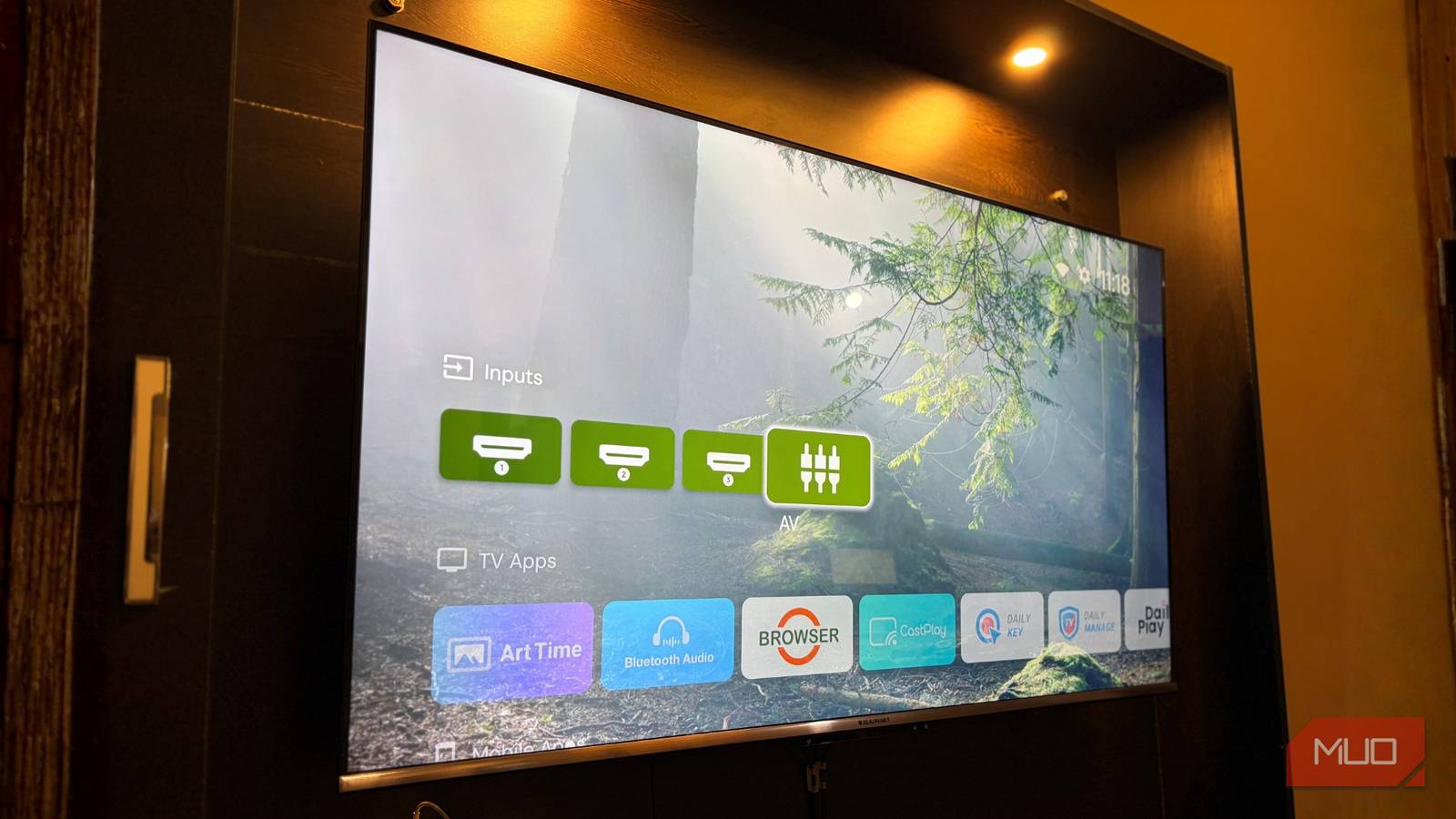Artificial intelligence can numb us into unthinking zombies. But on the other hand, we can take its immense powers and make it nudge us into action or critical thought. Usually, we have to actively poke chatbots to get results, but ChatGPT’s Scheduled Tasks feature changes that dynamic.
By setting up automations that run at specific intervals, you can turn the chatbot into a proactive assistant that works even when you’re offline. I’ve spent some time experimenting with Scheduled Tasks to make me feel more productive by building habits, learning more consistently, and staying organized.
To make ChatGPT’s Scheduled Tasks more effective, set up just 2-3 automations and see if they become part of a routine. ChatGPT allows a maximum of 10 automations at one time.
8
Start the day with a productivity check-in
A quick morning template keeps your day focused
The day can easily get away from us. A quick one-minute check-in helps me set up the three important tasks for the day. The first one is a priority, followed by two more. You can also list your priorities, but I suggest keeping it to a manageable three. Spending even one minute on a structured prompt can improve how you approach your work. I find that it helps me take a more mindful approach to time management.
Every day at 8 a.m., ask me for my three priorities for the day and help me structure them.
7
Get weekly creative ideas automatically
Keep your creative pipeline fresh without effort
It’s easy for our brains to get foggy. Using ChatGPT’s Scheduled Tasks as a creative prompting tool helps my brain shift gears and think of ideas, and even sparks lateral ideas from the original one. In my brief experiments, I have found that it also serves as a mindfulness aid, as I tend to think more about the idea than any other random thought.
Send me five creative newsletter ideas (each a 6–8 word title + one-line description) tailored for my critical thinking newsletter. Keep ideas fresh, practical, and actionable for readers who want to just scan through to learn, remember, or solve problems. Include one suggested subject line for each idea.
6
Create a personalized morning news briefing
Start your day with a digest of the topics you actually care about
I have swapped my doomscrolling with more intentional reading. Getting drowned in negative news doesn’t help either, so this scheduled task in ChatGPT lets me narrow my focus and pick what I want to read. I configured mine to ignore general politics and focus strictly on tech industry shifts and overnight sports scores.
Generate a concise summary of the most important overnight news regarding [insert topics, e.g., Artificial Intelligence, Premier League scores, and the economy’s major moves]. Send it to me at [Time].
Structure the response as a bulleted list with three key takeaways per topic. Keep the tone neutral and professional. If there is no significant news for a specific topic, please state that clearly rather than forcing a result.
5
Stay accountable with your health habits
Simple reminders to improve hydration, sleep, or steps
The smartwatch or a mobile app isn’t the only way to stay on track with healthy habits. We can tie this into our ChatGPT usage as well. And ChatGPT’s Scheduled Tasks will gently nudge you anytime you set it up for.
Every day at 4 p.m., remind me to drink at least 2 liters of water and ask whether I’ve hit my step count target.
4
Monitor subscription renewals and budget tramlines
Stay on top of your subscriptions and stop losing money to the unwanted ones
While ChatGPT can’t access your bank account directly for security reasons, you can use it as a proactive financial reminder system. I set a monthly task for the 1st of the month that lists my known recurring subscriptions and asks me to verify if I’m still using them. It acts as a manual audit prompt. Simply seeing the list “Netflix, Gym, Adobe Creative Cloud” pop up forces me to evaluate if I’m actually getting value from them that month.
This is my monthly financial check-in. Here is my list of current recurring subscriptions: [Netflix, Spotify, Gym, Adobe Creative Cloud, Amazon Prime]. Please present this list to me and ask: ‘Which of these have you not used in the last 30 days?’ If I identify any, suggest the specific steps required to cancel them or negotiate a lower retention rate.
ChatGPT can become a custom budget guide, but do consider what information you want to give it. But you can easily do a minimal self-audit with something like:
On the first of every month at 6 p.m., remind me to update my expenses and ask three questions about my budget.
3
Receive daily mini skill challenges
Learn in small doses, you’ll actually stick to
Tiny steps compound. Also, these mini-skill challenges help me evaluate what I have learned and where the skill gaps still are. You can set this up for any topic and any test type (maybe a quiz).
Every day at 2 PM, send me a one-sentence Procreate tip and a 1-minute exercise.
2
Prepare a “Sunday Reset” household checklist
Organize your chores so you don’t start with a Monday mess
I used to scramble on Monday mornings because I forgot to do laundry or clean up my car. Now, I run a scheduled task every Sunday at 9:00 AM with a prioritized checklist of household chores tailored to my living space. You can even have it rotate tasks, as stuff like deep cleaning the oven doesn’t need to happen every week, so ChatGPT can cycle that into the list once a month while keeping “change the bedsheets” as a weekly routine.
It is Sunday morning. Please generate a prioritized cleaning checklist for my [apartment/house]. Include three ‘Quick Wins’ (tasks under 5 minutes) and two ‘Deep Clean’ tasks (tasks under 20 minutes). Focus specifically on the [Living Room and Kitchen] this week. Present this as a checkbox list I can tick off.
1
Inject novelty into your everyday life
Start a ‘do one new thing each day’ challenge
Life gets monotonous. So, this ChatGPT Scheduled Tasks is one of my favorites. A small daily novelty keeps my brain energized and at least “remember” each passing day a bit differently.
Every day at 12 a.m., suggest one tiny new thing I can try (online or offline) based on my interests.
ChatGPT’s Scheduled Tasks can be an invisible assistant
Automation is only as good as the friction it removes. These examples have helped me reclaim some of my mental bandwidth. Of course, I can do without them. But the automations have forced a consistency in my routine. Start your own experiments and see how much mental load they clear.













